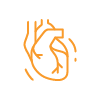Heart facts that will make you take better care of your heart
October 9, 2020

Heart facts that will make you take better care of your heart
Sometimes, when you are surrounded by silence or when you are filled with anxiety, the sound of your heartbeat fills your ears. Like a drum beat that sets the tempo of a song or a parade, your heartbeat sets the tone of your life. Happiness or sorrow, peace or stress, awake of asleep- your heart has a special beat for each. The best way to know your heart health is your pulse.
When a you are extremely angry or distressed, your heart pounds faster and sometimes its stress will be evident as a visible pulse throbbing on your forehead. A pulse is the expansion of the arteries as blood is pushed through them with each beat and the relaxation between each beat. It is the best measure of your heart beat.
Here a couple of facts about your pulse
- Normal pulse rate for an adult is 60 to 100 beats per minute
- Your approximate maximum pulse rate can be calculated by subtracting your age from 220
If you are healthy, your resting heart rate should be lower than 100. Adopt a healthy lifestyle to keep it that way. With 1,15,000 beats and 2,000 gallons of blood to pump through your body every day, your heart needs all the care to keep it healthy.
Heart disease is a major killer in the world
An estimated 17.9 million people die due to heart disease every year in the world. The startling fact is that 80% of these deaths are preventable. Quitting smoking, managing diabetes, blood pressure and cholesterol and maintaining a healthy weight can add about 10 years to your life.
Awareness of these facts is vital in improving the health of society at large. According to specialists the death rate due to cardiovascular diseases has declined by about 41% in the United States between 1990 and 2016, but in India the death rate due to cardiovascular disease has increased by 34% in the same period. This could be attributed to the fact that there is not much awareness about heart disease and its risk factors among the general public.
Heart problem is as old as humanity and as young as a new born. A 3500-year-old Egyptian mummy is the earliest documented case of heart disease. A one-minute-old baby was the youngest to undergo a heart surgery. Modern medicine offers many invasive, minimally invasive and non-invasive treatment options for heart disease, but prevention is still the best cure.
If your blood vessel system were to be laid out end to end, it would stretch to over 60,000 miles. Your heart should be in peak condition to pump blood through this great distance every second of your life. Any small problem could result in the following symptoms of heart disease:
- Chest pain or discomfort
- Pain or discomfort in the arms, shoulder, elbows, jay or back
- Shortness of breath
- Nausea/ vomiting
- Excessive sweating
If you have any of these symptoms contact our cardiologist immediately.
If you do not have these symptoms, maintain your heart health with a healthy diet of fruits and vegetables. Limit intake of sodium, fatty and sugary foods. Exercise regularly and laugh with friends and family. This will decrease your risk of heart disease.
Remember, heart disease is the number one killer in the world. Don’t become its next victim.
To check your heart health, get a cardiac check-up today.








